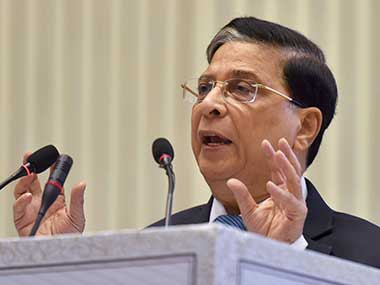Former Chief Justice of India Dipak Misrak, who had presided over Supreme Court benches that delivered a series of key verdicts like the ones of Aadhaar, homosexuality and entry of women into the Sabarimala temple, said on Friday that constitutional sovereignty was supreme. Misra was speaking at the
Hindustan Times Leadership Summit. Speaking on the issue of
entry of women into the Sabarimala temple , he said, “We introduced the concept of constitutional morality and we have said that this morality is one which is evolved by the Constitution. Therefore, you cannot keep women away (from the temple).” He said some journalists had called him a “warrior of gender justice” after the verdict. [caption id=“attachment_5051721” align=“alignleft” width=“380”] File image of former CJI Dipak Misra. PTI[/caption] “I feel happy that I am a warrior of gender justice. I feel women are to be respected. Where women are respected, there lies the home. I do not mean she becomes the housewife. I mean she becomes an equal partner in life,” he said. Misra also spoke on the issue of lynchings in the country and said that society needed to cultivate tolerance. “How can a single man or a group engage in moral policing? There is a rule of law,” Misra said. “Our definition of constitutional morality is not bound. In the lynching case, the majesty of law cannot be ignored because an individual or group takes law into their own hands and becomes a law unto themselves,” he added. “In a pluralistic society, we must cultivate the idea of tolerance respecting others’ views. Unless we do that, we are violating the rule of law,” Misra said, adding that “identity is divinity. Without this, you are losing the divinity endowed to you by divinity itself. You cannot barter with identity.” “You can’t live with hope alone. Hope must be concretised. Hope must become a practical reality. That is why an attempt has been made by courts to realise this hope,” Misra further said. He also spoke against corruption. “Corruption is not to be judged by degree. It destroys the societal will to progress, kills the conscience, jettisons the glory of the institutions, and paralyses the economic health of the society,” he said. Misra has headed various benches of different combinations and delivered several verdicts in the recent past. These include upholding the Centre’s flagship scheme Aadhaar with certain riders and decriminalising consensual gay sex and adultery. The verdicts also include judgments in the Koregaon-Bhima violence case and allowing all women entry into the Sabarimala temple. He was appointed as an additional judge of the Orissa High Court on 17 January, 1996, before his transfer to the Madhya Pradesh High Court. He became a permanent judge on 19 December, 1997. He assumed charge of the office of chief justice of Patna High Court on 23 December, 2009 and became chief justice of the Delhi High Court on 24 May, 2010. He was elevated as a judge of the apex court on 10 October, 2011 and became the Chief Justice of India on 28 August, 2017. With inputs from PTI
Former Chief Justice of India Dipak Misra said that constitutional sovereignty was supreme.
Advertisement
End of Article


)

)
)
)
)
)
)
)
)



